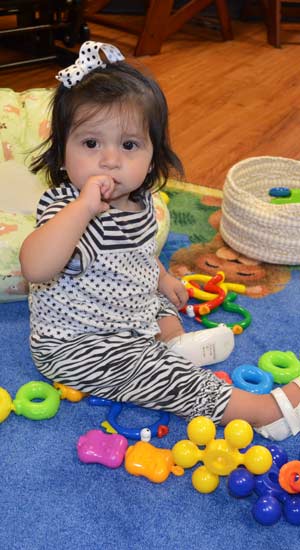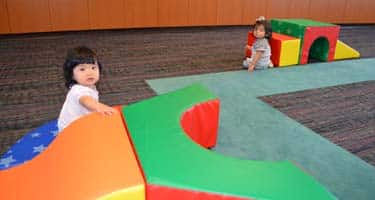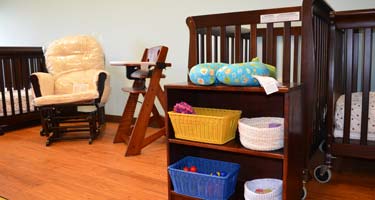- M-F: 6:30am to 6:30pm
- (972) 218-0365
- 1555 E. Sandy Lake Rd. Coppell, TX 75019

At Riverchase Montessori we are aware of the ability infants have of absorbing from their surroundings. The daily needs such as diapering, feeding and playing are optimal times for interaction. Using these times for social learning experiences encourages full participation of the infant and the caregiver. These times become the opportunity for communication and for nurturing.
The infants’ curriculum is based on Physical and Motor Development: Infants have a sensitive period for movement. Gross motor skills develop rapidly from three months to three years. By providing the appropriate movement opportunities and maintaining a safe environment that does not restrict the exploration for the infants in the room, motor development is allowed to unfold naturally and at the infants’ own pace.
All meals, including breakfast, lunch and three snacks, are cooked and served at school daily as part of your monthly tuition. However, infants ages 6 weeks to 12 months are fed only and strictly what parents recommend.
Extracurricular activities are also part of your tuition: Multi-sensory Gym for Infants and Toddlers on daily basis, Music for Motor Development, Rhymes and Songs.

|

|
Children ages 13 months to 17 months and 18 to 23 months are part of the Toddlers’ Program. This Program prepares the child for the Transition Class. The curriculum for toddlers is based on a well prepared environment with activities in different areas such as:
All fresh meals (breakfast, lunch and three snacks) are cooked and served at school daily as part of the monthly tuition. Extracurricular activities also part of your tuition are: Multi-sensory Gym for Infants and Toddlers on daily basis, Music for Motor Development, Rhymes and Songs.
Riverchase Montessori School is committed to helping your child to grow and develop in our school, learning the why and the how of the many academic questions they will face while growing up.

Using the classic Montessori theory and philosophy, we serve families all around the Coppell, Irving, Las Colinas, Valley Ranch, Grapevine, Lewisville, Carrollton, and Farmers Branch, TX area. Call for a tour!
1555 E. Sandy Lake Rd.
Coppell, TX 75019
(972)218-0365
Copyright 2018 Riverchase Montessori. All Rights Reserved.